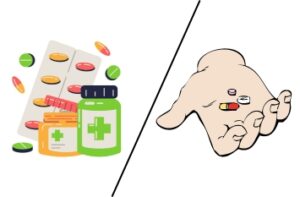
How Long Does It Take for Psychiatric Medication to Work?
How Long Does It Take for Psychiatric Medication to Work? When you start taking psychiatric medication — whether for depression, anxiety, bipolar disorder, or another

Antisocial behavior is a complex phenomenon that encompasses a range of behaviors characterized by disregard for societal norms, rules, and the rights of others. It often involves behaviors such as aggression, deceitfulness, impulsivity, and a lack of empathy.
While antisocial behavior shares some similarities with certain mental health disorders, such as conduct disorder and antisocial personality disorder (ASPD), it is not universally classified as a mental health disorder on its own.
Instead, it is often considered a pattern of behavior that may co-occur with various mental health conditions or arise from a combination of genetic, environmental, and social factors.
Antisocial Personality Disorder (ASPD) is a mental health condition characterized by a pervasive pattern of disregard for and violation of the rights of others. Individuals with ASPD often display traits such as a lack of empathy, deceitfulness, impulsivity, and a disregard for societal norms and rules.
It’s important to distinguish between occasional antisocial behavior, which may be a response to situational factors or temporary stressors, and ASPD, which represents a long-standing pattern of behavior that typically emerges in adolescence or early adulthood and persists into adulthood.
While occasional antisocial behavior may not necessarily indicate the presence of ASPD, it’s essential to recognize the potential warning signs and seek a professional evaluation if concerns arise.
Antisocial behavior can sometimes prompt individuals to question whether they might have Antisocial Personality Disorder (ASPD). While occasional antisocial behavior is relatively common and may stem from various factors such as stress, frustration, or social discomfort, ASPD is a diagnosed mental health condition characterized by a persistent pattern of disregard for the rights of others.
If you find yourself consistently exhibiting behaviors such as deceitfulness, impulsivity, lack of empathy, and repeated violations of societal norms, it may be worth seeking professional evaluation to determine whether ASPD or another mental health condition could be contributing to your behavior.
However, it’s essential to approach self-diagnosis with caution and seek guidance from qualified mental health professionals who can provide accurate assessment and support.
Understanding the underlying causes of antisocial behavior is crucial for developing effective interventions and support systems. Several factors contribute to the development of antisocial tendencies, ranging from genetic predispositions to environmental influences and psychological factors.
1.Genetic factors:
Research suggests that genetics plays a significant role in predisposing individuals to antisocial behavior. Studies have identified genetic variations that may increase the likelihood of developing traits associated with antisocial personality disorder (ASPD).
However, genetics alone are not deterministic, and environmental factors also play a crucial role in shaping behavior.
2.Environmental influences:
Childhood experiences and upbringing can significantly impact the development of antisocial behavior. Factors such as exposure to violence, neglect, abuse, unstable family environments, and lack of parental supervision can increase the risk of antisocial behavior later in life.
Additionally, socioeconomic factors and access to resources can influence an individual’s likelihood of engaging in antisocial behaviors.
3.Psychological factors:
Various personality traits and mental health conditions are associated with antisocial behavior, with ASPD being one of the most prominent. Individuals with ASPD typically exhibit traits such as impulsivity, deceitfulness, lack of empathy, and disregard for societal norms and rules.
Other psychological factors, such as low self-esteem, difficulty regulating emotions, and a history of trauma, can also contribute to antisocial tendencies. Understanding these psychological factors is essential for addressing the underlying issues and providing appropriate support and treatment.
Antisocial Personality Disorder (ASPD) in women presents a unique set of challenges and considerations within the realm of mental health. While ASPD is often associated with men, it is crucial to recognize that women can also be affected by this condition.
Research suggests that ASPD manifests differently in women compared to men, with females often exhibiting less overtly aggressive behaviors but still displaying patterns of deceitfulness, manipulation, and a disregard for the rights of others.
Despite the prevalence of ASPD in women, it is frequently underdiagnosed or misdiagnosed due to gender biases and stereotypes. Understanding the nuances of ASPD in women is essential for accurately identifying and addressing the condition, as well as for providing tailored interventions and support to affected individuals.
Recognizing antisocial behavior is crucial for early intervention and support. Understanding the signs and symptoms of Antisocial Personality Disorder (ASPD) can help identify individuals who may need assistance in managing their behaviors.
Signs and symptoms of ASPD:
ASPD is characterized by a pervasive pattern of disregard for and violation of the rights of others. Individuals with ASPD often exhibit a lack of empathy, deceitfulness, impulsivity, and a disregard for societal norms and rules. They may engage in behaviors such as lying, manipulation, aggression, and repeated criminal activity without remorse.
Gender considerations:
When recognizing antisocial behavior, it’s essential to consider the manifestation of ASPD in women. Women with ASPD may display different behavioral patterns compared to men, which can pose challenges in diagnosis. While men with ASPD often exhibit overtly aggressive behaviors, women may demonstrate more subtle forms of manipulation and deceitfulness.
Gender biases and stereotypes may also contribute to the underdiagnosis or misdiagnosis of ASPD in women, highlighting the importance of considering gender-specific factors when assessing antisocial behavior. Recognizing these gender considerations can facilitate more accurate identification and intervention for individuals, regardless of gender, who may be struggling with ASPD.
Living with Antisocial Personality Disorder (ASPD) can be challenging, but there are coping strategies that individuals can employ to manage their symptoms and improve their quality of life. These strategies focus on promoting self-awareness, fostering positive relationships, and developing healthier coping mechanisms.
Therapy: Engaging in therapy, such as cognitive-behavioral therapy (CBT) or dialectical behavior therapy (DBT), can help individuals with ASPD identify and challenge maladaptive thoughts and behaviors.
Anger management techniques: Learning techniques to manage anger and impulsivity, such as deep breathing exercises or mindfulness meditation, can help individuals with ASPD regulate their emotions and reduce the risk of impulsive behaviors.
Social skills training: Participating in social skills training programs can help individuals with ASPD learn effective communication and interpersonal skills, improving their ability to form and maintain healthy relationships.
Substance abuse treatment: Addressing substance abuse issues, which often co-occur with ASPD, through rehabilitation programs and support groups can help individuals reduce the risk of engaging in harmful behaviors.
Stress management techniques: Practicing stress-reduction techniques, such as regular exercise, hobbies, and relaxation exercises, can help individuals with ASPD cope with daily stressors and triggers more effectively.
Support groups: Joining support groups for individuals with ASPD or similar conditions can provide a sense of community and understanding, as well as opportunities to learn from others’ experiences and share coping strategies.
Setting boundaries: Learning to set and respect personal boundaries in relationships can help individuals with ASPD maintain healthier interactions and avoid conflicts.
Seeking support from loved ones: Building a support network of friends, family members, or trusted individuals who can offer empathy, understanding, and encouragement can provide valuable emotional support for individuals with ASPD as they navigate their condition and work towards personal growth and recovery.
Recognizing whether you may have Antisocial Personality Disorder (ASPD) can be a complex process that often requires professional evaluation by a qualified mental health professional. However, there are certain signs and symptoms that may indicate the presence of ASPD. These include a pervasive pattern of disregard for and violation of the rights of others, a lack of empathy, deceitfulness, impulsivity, and a history of repeated antisocial behaviors.
It’s essential to consider the duration and severity of these symptoms, as well as their impact on various areas of your life, such as relationships, work, and legal involvement. If you suspect that you may have ASPD or are experiencing difficulties managing your behavior, seeking help from a mental health professional is crucial for accurate assessment and appropriate support and treatment.
Remember, self-diagnosis is not recommended, and seeking professional guidance can provide clarity and assistance in navigating your mental health concerns effectively.
Understanding antisocial behavior and its various facets, including Antisocial Personality Disorder (ASPD), is crucial for promoting awareness, empathy, and effective interventions. Through exploring the causes, manifestations, and coping strategies associated with antisocial behavior, we gain insight into the complexities of this condition and the challenges individuals may face. By recognizing the signs and seeking professional help when needed, individuals affected by antisocial behavior can embark on a journey of self-awareness, growth, and recovery.

How Long Does It Take for Psychiatric Medication to Work? When you start taking psychiatric medication — whether for depression, anxiety, bipolar disorder, or another

Relationships With Mental Illness: Understanding and Navigating the Challenges In a world where mental health is still stigmatized, finding love and building healthy relationships can

I Need to Talk to Someone, But I’m Not Suicidal Feeling the need to talk to someone but not experiencing suicidal thoughts is a common
